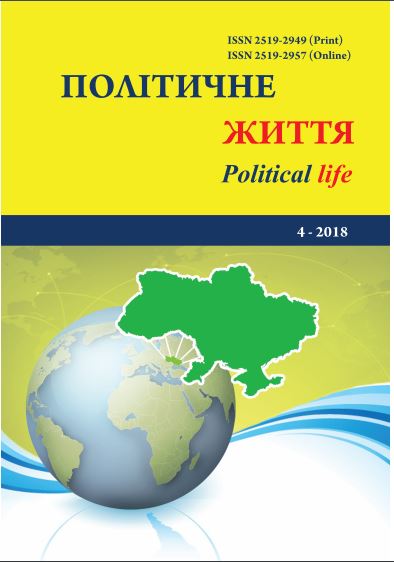The political context of the Belgian language policy model.
DOI:
https://doi.org/10.31558/2519-2949.2018.4.12Keywords:
model, language policy, Belgium, Ukraine, political problems, regions, federationAbstract
The political context of the language policy model of Belgium, which, in connection with the languagepolitical problems that split it from the middle, was forced to conclude an alliance treaty and thus to transform from a unitary state to a federal one. The article states that this step did not add to the Belgian community either peace or peace, a lesson for Ukrainian prorussian politicians who, referring to the language and political experience of this state, are trying to introduce in Ukraine a policy that seems to be completely" "Decentralization, regionalization and federalization, which, in their conviction, will strengthen inter-political and inter-governmental relations in the state and will solve in Ukraine all the language-political problems that also split the country from the inside and outside. The author emphasizes that the constituent part of the political context of the language policy model of Belgium, as well as Ukraine, is the language-political problems that are associated with a third party that interferes in the internal affairs of these states. The author tries to show that the language policy of Belgium, which is an important state of the European Union, is closely linked to the linguistic policies of France and the Netherlands, each of which, unlike the Ukrainian authorities, cares about the development of the native state language not only in its own country, and not only on the eve or during the elections to add a few thousand more votes to victory, but also beyond its borders. However, Ukraine’s linguistic policy is closely linked to the language policy of neighboring states such as Russia, Hungary, Romania and Poland, each of which is not at all the language in Ukraine, and which language policy is conducted by the Ukrainian authorities in relation to national minorities and indigenous peoples who live compactly on its territory. In this sense, the researcher tries to prove that the language-political model of Belgium is not suitable for Ukraine, which, in comparison with this state, does not consist of separate regions historically populated by other nations, have their own history of development, language and culture, customs and traditions, which have nothing to do with other regions. The national-democratic political forces of Ukraine, referred to by the researcher, claim that the language and political experience of this state can not be a good example for Ukraine, which does not consist of foreign lands, separate territories, which, with the exception of the Crimea, are populated by the overwhelming majority of Ukrainians.References
Головатий М. Діалог між владою і суспільством – важлива засада формування української державності // Політичний менеджмент. – № 5. – 2011. – С. 20-24.
Котигоренко В. Ризики альтернативних версій мовної політики в Україні / Мовна ситуація в Україні: між конфліктом і консенсусом. – К.: ІПіЕНД імені І.Ф. Кураса НАН України, 2008. – 398 с.
Куць О. Мовна політика деяких зарубiжних держав: Навчально-методичний посібник з питань мовної політики й міжнаціональних відносин для студентів, розрахований на поглиблене вивчення курсу «Політологія». – Харків: Харківський національний університет імені В. Н. Каразіна, 2011. – 200 с.
Мала енциклопедія етнодержавознавства / НАН України. Ін-т держави і права ім. В. М. Корецького; Редкол.: Ю. І. Римаренко (відп. ред.) та ін. – К.: Довіра: Ґенеза, 1996. – 942 с.
Мовна ситуація в Україні: між конфліктом і консенсусом. – К.: ІПіЕНД імені І. Ф. Кураса НАН України, 2008. – 398 с.
Погрібний А. Світовий мовний досвід та українські реалії: Інститут відкритої політики. – Київ, «Медобори» (ПП Мошак М.І.), 2003. – 72 с.
Політична лексика сучасного українського політика і громадянина: енциклопедичний словникдовідник / Укладач В. М. Піча; наук. ред. Л.Д.Климанської, Я. Б. Турчин, Н. М. Хоми [Колектив авторів: І. В.Алексєєнко, О. І. Романюк, М. В. Школяр та ін.]. – Львів: «Магнолія 2006», 2017. – 438 с.
Політологія: сучасні терміни і поняття. Короткий навчальний словник-довідник для студентів ВНЗ I-IV рівнів акредитації. – 4-те видання, виправлене і доповнене / укладач В. М. Піча, наук. редакція Л.Д.Климанської, Я. Б. Турчин, Н. М. Хоми. – Львів: Новий Світ. – 2000, 2015. – 516 с.
Яковлева О. Національні моделі організації неодномовного мовного простору («стара» Європа) // Український науковий журнал «Освіта регіону». – Київ, 2011. – №7. – С. 147-149.
Reinhilde P. Integration in Flanders (Belgium) – Citizenship as achievement: How intertwined are ‘citizenship’ and ‘integration’ in Flemish language policies? [Text] / P. Reinhilde // Journal of Language and Politics. − 01.2015. − 14(3). − P. 16-21.

